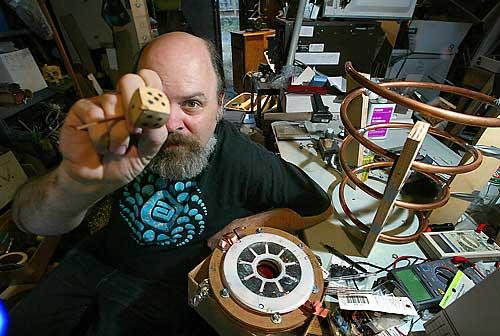|
|
|

Skeptic Summary #337
By The Staff
Posted on: 7/10/2011
|
ADHD, Caylee Anthony, bizarre website, Rebecca Watson, the Science Hobbyist and more!
|
Week ending July 09, 2011 (Vol 8, #25)
Welcome to the Skeptic Summary, a quick week-in-review guide to the Skeptic Friends Network and the rest of the skeptical world.

Forum Highlights:Adult ADHD - Leave diagnosis to professionals.
How do people in the US feel about the… - Caylee Anthony murder trial? What is justice?
What do you think about this theory/website? - Dualistic Biology & mirror matter reminds us of Timecube.
Editor’s Choice: I do not like Rebecca Watson (aka skepchick) - Sexism in skepcism is an extremely touchy subject, apparently.

Kil’s Evil Pick:Science Hobbyist — Where to begin? Science Hobbyist is a science site with a twist. It just seems to go everywhere. Link city! I couldn’t possibly explain where every topic on all of the menus go to because there are so many of them. The fun part is in the exploring.

For example, there’s the Tesla Coil Page. If you go there you will find not only a whole lot of links to pages dedicated to Nikola Tesla, but videos, books and stuff you can build along with discussion groups and photos.

Click on to Weird Science and off you go to a page that links to pages like Hoaxes, The Antigravity “Underground”, and even an Against Excessive Skepticism Collect Quotes page, that includes this gem:“I am not very skeptical… a good deal of skepticism in a scientific man is advisable to avoid much loss of time, but I have met not a few men, who… have often thus been deterred from experiments or observations which would have proven servicable.” — Charles Darwin There’s a Good Stuff page, Traffic Waves (go look), Unqise Microwave Oven Experiments, and directions for building an Ultra-Simple Hovercraft. Pretty cool, eh?
Need help in finding Kids’ Science Projects? It’s on one of the menus!
On and on it goes. This is both a serious science-lovers’ site, a completely whacked-out place to visit. And it’s educational, even if you don’t want the education. It just can’t be helped!
Creator of the site, William J. Beaty, has this to say about himself and Science Hobbyist:In the past I’ve spent time as an embedded designer and software engineer, consulted on textbooks, lectured about electricity education, designed science projects for kids, and built physics exhibits while running the electronics dept. at the Museum of Science in Boston.
Today I spend my free time running Science Hobbyist, a large website for amateur science and science education. You’ll also find me hanging out on the PHYS-L physics education forum, holding forth about various ways to explain all things electrical.
I was born in the US but I was raised on the island of Guam, which gave me a bit of an “outsider” viewpoint which I’ve carefully tried to preserve. And when you’re in 3rd grade while both your parents are school teachers, it gives you a critical eye regarding the foibles of educators. I was bitten by the science bug at an early age and had fun with a chemistry set, but I soon discovered where the REAL magic was hidden: hobbyist electronics. Even more magical is the Black Art of electrostatics. And to search for traces of true magic in the sciences, nothing beats actual magic.

William J. Beaty
So there you have it. Actually you don’t have it because there is so much of it. (This is a bit like last week’s pick that way.) You will just have to go there and explore. That’s the sciency thing to do, anyhow.

SkeptiQuote:Modern science should indeed arouse in all of us a humility before the immensity of the unexplored and a tolerance for crazy hypotheses. — Martin Gardner |

Chat Highlights:Wednesday: We started with a story filled with both fast money and women (well at least one), but quickly turned to TAM-9. The count-down clock is ticking… With everything going around about Rebecca “Skepchick” Watson and Richard Dawkins, TAM will get interesting. Other participants of TAM were mentioned too, like Paul Porvensa. Finally Kil promised not to talk about TAM. Chat also touched on subjects like theists’ fear and intolerance of atheists, representatives of the anti-vax movement, and then “Face in Space”: sending up a photo of yourself with the last Space Shuttle mission. We back-tracked from there to German rocket scientists and heavy water. Chat ended with social networking, on Skeptic Friends Network and FaceBook.
Come chat with us. 
New Members This Week:TiffanyA
DeafScribe
(Not a member? Become one today!)

Elsewhere in the World:‘Burn the witches!’: Pagans find wood piled up outside their door after ‘furious Christians try to drive them out of market town’
Effective things can come from silly places
Lawmakers pushing creationism in schools is a bad idea
Mass. Pool Drowning: How It Happened
NASA Launches Space Shuttle on Historic Final Mission
Oh, no, not again… once more unto the breach
Pleistocene Treasures, at a Breakneck Pace
A priest and a rabbi go into an elevator and…
On Sexism, Objectification, and Power
The Skeptic’s Dictionary Newsletter #129
Skepticality #158 — Return to Lake Skepticamp
Skeptics and “backward masking”
This Month in Intelligent Design
What’s New by Bob Park
Got some skeptic news items? Send them to us, and we’ll think about adding them.

Book of the Week:Braintrust: What Neuroscience Tells Us about Morality, by Patricia S. Churchland.

“What is morality? Where does it come from? And why do most of us heed its call most of the time? In Braintrust, neurophilosophy pioneer Patricia Churchland argues that morality originates in the biology of the brain. She describes the ‘neurobiological platform of bonding’ that, modified by evolutionary pressures and cultural values, has led to human styles of moral behavior. The result is a provocative genealogy of morals that asks us to reevaluate the priority given to religion, absolute rules, and pure reason in accounting for the basis of morality.
Moral values, Churchland argues, are rooted in a behavior common to all mammals — the caring for offspring. The evolved structure, processes, and chemistry of the brain incline humans to strive not only for self-preservation but for the well-being of allied selves — first offspring, then mates, kin, and so on, in wider and wider ‘caring’ circles. Separation and exclusion cause pain, and the company of loved ones causes pleasure; responding to feelings of social pain and pleasure, brains adjust their circuitry to local customs. In this way, caring is apportioned, conscience molded, and moral intuitions instilled. A key part of the story is oxytocin, an ancient body-and-brain molecule that, by decreasing the stress response, allows humans to develop the trust in one another necessary for the development of close-knit ties, social institutions, and morality.
A major new account of what really makes us moral, Braintrust challenges us to reconsider the origins of some of our most cherished values.”
— Product Description

This Week’s Most-Viewed Pages:Forum Topics:- Funny FAILS
- The Mythicist position
- Dr. Jeffery Life and Cenegenics
- A Modest Bleeding Proposal (reposted)
- Super generator? Perpetual motion? Another grift?
- Moon-walker claims alien contact cover-up
- How do people in the US feel about the…
- Stan Lee’s superhumans
- The Battle of Tehran
- Adult ADHD
Articles:- Evolving a Venom or Two
- Fundamentalists Hate Noah’s Ark
- Evidence Cited as Hard Proof of the Existence of Satanic Cults
- Scientific Truth
- The Myth of the Missing Moon Dust
- Miracle Thaw — The Bogus Miracle
- TAM5
- Kent Hovind is a Big Phony!
- The Bible’s Bad Fruits
- Skeptic Summary #336
There were 5,943 daily visitors this week.
More issues of the Skeptic Summary can be found in our archive.
The Skeptic Summary is produced by the staff of the Skeptic Friends Network, copyright 2011, all rights reserved.
Read or Add Comments about the Skeptic Summary
|
|
|
Back to Skeptic Summary
|
![]()